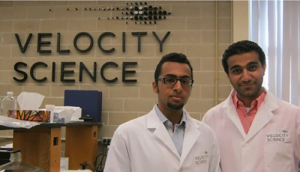
NERv: the dream of risk-free operations
Imagine a world with risk-free operations. More than 200 Canadians died of surgical complications in 2011 alone, according to Statistics Canada. A UWaterloo student holds a envisions a world without these risks.
Guest blog by Youssef Helwa
My name is Youssef Helwa and I am a 4A Nanotechnology Engineering student. I am the co-founder of NERv, a UWaterloo startup aiming to revolutionize patients’ health care. Our team at NERv is working every day to design the biosensor that will predict post-operative complications from the patient’s body marker. The sensor is able to correlate trends from the markers inside the body to real complications that could later arise and have a fatal impact on the patient. If the sensor detects that something is going wrong it sends a wireless signal to a receiver outside the body informing the doctor to take action.
A complication arising in patients after an operation is a very common problem. As a person who grew up in a family of doctors, I could relate to the stress both on the patient and the doctor from these operations. The question I had in this current age is why do doctors and patients have to live under this stress and why can’t all operations be risk free? I started going through literature and what I discovered was that all of these complications were handled by trying to improve medical practices and that there isn’t a real communication between the problems doctors face and what engineers could offer. A team of UWaterloo engineers, doctors and myself are attempting to address this problem.
Once we embarked on this journey we had great support from different university programs. The first was the enterprise co-op program through the Conrad Centre, which provided us with enterprise educational materials and networking opportunities. We also got the support of the Waterloo Institute of Nanotechnology and University professors. In addition we are part of the Velocity Science program, which provides us with lab space to develop our technology.
We have been in this journey for more than a year now and are working our best to have our first working prototype done by mid-2015.


